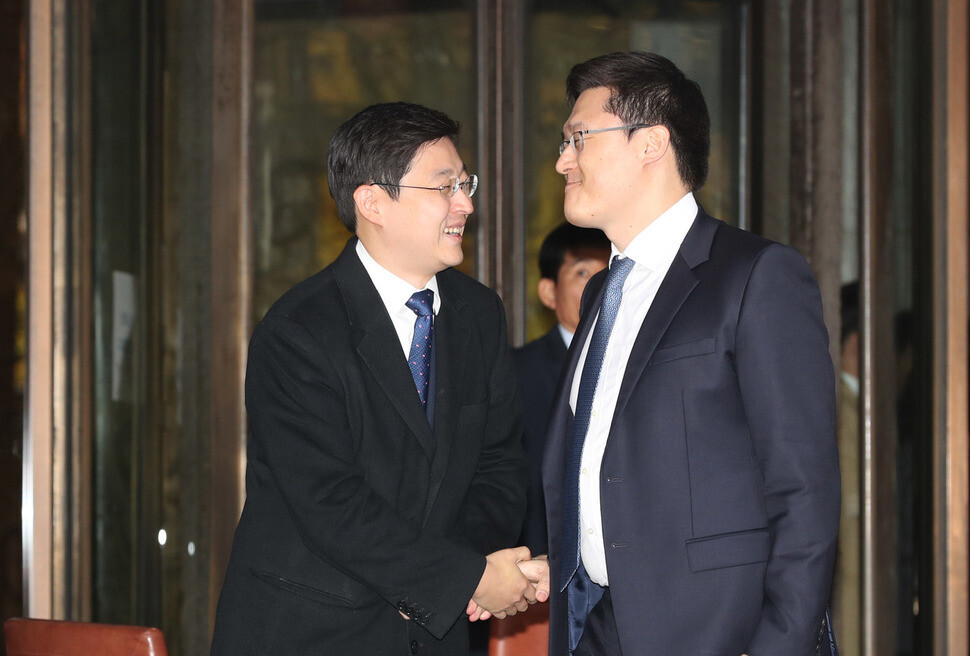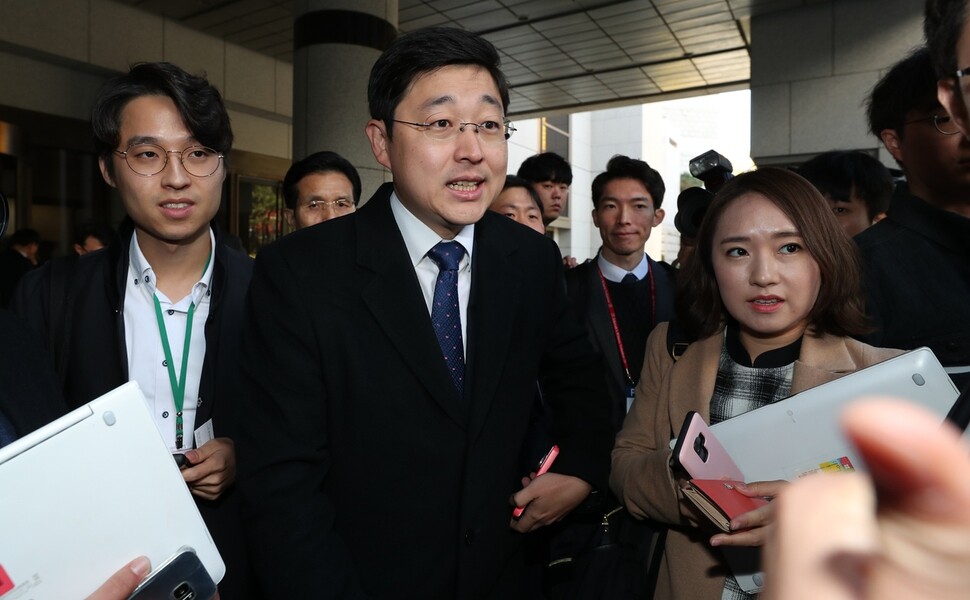hankyoreh
Links to other country sites 다른 나라 사이트 링크
Supreme Court gives first-ever acquittal of conscientious objector to military service

From an initial constitutionality review recommendation in 2002 to the earliest first-trial acquittal in 2004, the earliest second-trial acquittal in 2016, and ultimately a Constitutional Court decision last June ordering the institution of an alternative system for mandatory military service – progress in the human rights of people refusing military service on grounds of religion or conscience has been achingly slow. In a full bench ruling on Nov. 1, the Supreme Court determined that the decision not to bear arms constitutes “justifiable grounds” for not enlisting according to the Military Service Act.
As he emerged from the courtroom following the judgment that day, the recipient of the Supreme Court’s first-ever acquittal, 34-year-old Oh Seung-heon, embraced his wife.
“I am grateful for the Supreme Court’s bold decision, and I also appreciate the public’s show of support,” a flushed Oh said before reporters. “I truly sensed the citizens’ great generosity.”
Oh, who is a Jehovah’s Witness, went on to say, “Today was possible because of the 20,000 fellow conscientious objectors [previously punished for not completing their military service obligation].”
“I’m well aware of the public’s concerns about potential abuses of alternative service. I intend to serve diligently to allay those concerns,” he continued.

A 14-year struggle finally over
Oh’s experience over the past 14 years was no different from those of other conscientious objectors. Having followed his grandmother and parents into the Jehovah’s Witnesses faith, he decided against performing military service in order to uphold the Bible’s teachings of “love thy neighbor as thyself” and “all who draw the sword will die by the sword.” His father was forced to leave high school in the past after refusing to take part in military drills.
Oh’s first notice of enlistment was issued in 2003. He deferred taking action as he waited to see the decisions by the Constitutional Court and Supreme Court the following year. He waited again after the Ministry of National Defense announced the institution of an alternative system in 2007 under the Roh Moo-hyun administration. The alternative system’s adoption was nullified in 2008 after Lee Myung-bak took office as President, but Oh decided to postpone enlistment again to see what decision the Constitutional Court reached.
In 2011, the court reaffirmed the constitutionality of Article 88-1 of the Military Service Act punishing conscientious objection to military service – but the very next year, judge Kim Gwan-gu of Changwon District Court’s Masan branch decided to recommend a constitutionality review of Military Service Act provisions. Believing in his own innocence, Oh could not give up hope.
“The first few years were a disappointment. But while they might not have been changes at the level we wanted, the positive signals kept coming, and I was convinced it would be resolved eventually,” he said.
Oh was finally delivered for trial in Oct. 2013 after refusing to enlist despite receiving an active-duty induction notice. In his first trial the following year, the court sentenced him to 18 months in prison based on previous Constitutional Court and Supreme court judgments. The court in his second trial deferred judgment for over two years before eventually dismissing his appeal in June 2016. From there, Oh’s case went to the Supreme Court. But the guilty verdict against him was not immediately upheld as in past cases. Instead, a decision made in June to have a full bench ruling with all 13 Justices taking part.
Oh’s younger brother, also a conscientious objector, had already received a final Supreme Court judgment and served time in prison. His family members began to explain the situation to his young daughter – born the year of his indictment – so that she would not be too shocked. “Your dad may have to go to prison,” they told her. This year, Oh’s second child was born. Both daughter and son were looking on when the Supreme Court delivered their father’s ruling.
Small changes over the course of time
The five years of trials have not been entirely painful for Oh.
“Over the course of my trials, I could sense the little changes in the prosecutors’ and judges’ attitudes toward conscientious objection,” he said.
“They were more respectful than with ordinary criminals, and they would wait for the Constitutional Court to make a judgment. I also saw the prosecutors’ open arguments at the Supreme Court and sensed that the negative opinions did not represent the mainstream view.”
Oh is currently awaiting the institution of an alternative system before Dec. 31, 2019, in accordance with the Constitutional Court’s judgment.
“I know there are concerns that people might abuse the alternative system, or that we’ll be more comfortable than the active-duty soldiers. I think it’s something where we have to show them through our actions rather than trying to persuade them with logic,” he said.
“I plan to work hard so that people can say it’s a hundred times better than my being in prison,” he continued. “But I would like to see an alternative service system unrelated to the military institution so that we can uphold our conscience.”
By Kim Min-kyoung, staff reporter
Please direct comments or questions to [english@hani.co.kr]

Editorial・opinion
![[Column] Park Geun-hye déjà vu in Yoon Suk-yeol [Column] Park Geun-hye déjà vu in Yoon Suk-yeol](https://flexible.img.hani.co.kr/flexible/normal/500/300/imgdb/original/2024/0424/651713945113788.jpg) [Column] Park Geun-hye déjà vu in Yoon Suk-yeol
[Column] Park Geun-hye déjà vu in Yoon Suk-yeol![[Editorial] New weight of N. Korea’s nuclear threats makes dialogue all the more urgent [Editorial] New weight of N. Korea’s nuclear threats makes dialogue all the more urgent](https://flexible.img.hani.co.kr/flexible/normal/500/300/imgdb/original/2024/0424/7317139454662664.jpg) [Editorial] New weight of N. Korea’s nuclear threats makes dialogue all the more urgent
[Editorial] New weight of N. Korea’s nuclear threats makes dialogue all the more urgent- [Guest essay] The real reason Korea’s new right wants to dub Rhee a founding father
- [Column] ‘Choson’: Is it time we start referring to N. Korea in its own terms?
- [Editorial] Japan’s rewriting of history with Korea has gone too far
- [Column] The president’s questionable capacity for dialogue
- [Column] Are chaebol firms just pizza pies for families to divvy up as they please?
- [Column] Has Korea, too, crossed the Rubicon on China?
- [Correspondent’s column] In Japan’s alliance with US, echoes of its past alliances with UK
- [Editorial] Does Yoon think the Korean public is wrong?
Most viewed articles
- 1[Column] Park Geun-hye déjà vu in Yoon Suk-yeol
- 2Will NewJeans end up collateral damage in internal feud at K-pop juggernaut Hybe?
- 3N. Korean hackers breached 10 defense contractors in South for months, police say
- 4Why Korea shouldn’t welcome Japan’s newly beefed up defense cooperation with US
- 5[Guest essay] The real reason Korea’s new right wants to dub Rhee a founding father
- 6Thursday to mark start of resignations by senior doctors amid standoff with government
- 7[Editorial] New weight of N. Korea’s nuclear threats makes dialogue all the more urgent
- 8The dream K-drama boyfriend stealing hearts and screens in Japan
- 9Kim Jong-un expressed ‘satisfaction’ with nuclear counterstrike drill directed at South
- 10Terry Anderson, AP reporter who informed world of massacre in Gwangju, dies at 76